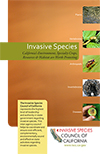California Invasive Species Advisory Committee (CISAC)
What is the CISAC?
The CISAC was created by the ISCC on April 8, 2009, to advise the council and develop recommendations. The CISAC provides its advice based upon input from and cooperation with other stakeholders and existing organizations addressing invasive species issues. The CISAC Charter lays out the body’s duties and structure.
Join the CISAC Listserv and receive e-mail announcements about meetings, press releases and other information about the CISAC.
The ISCC appointed the twenty-four members of the CISAC to serve as representatives of a broad range of constituencies. The CISAC met on September 24 and 25, 2009, to begin its work. Working groups formed to focus on several tasks. CISAC's first task, which is ongoing, was to develop a statewide "living list" of invasive species. The second effort, now in progress, was to develop a Strategic Framework for addressing invasive species in the State. Concurrent with these efforts is a discussion about engaging public participation in decision making. CISAC members are committed to helping steward the resources shared by all Californians, and the committee has adopted a statement of principles to frame its work.
Statement of Principles - adopted by CISAC on 12/15/2009
- We are committed to creating a sustainable future for California.
Managing invasive species is essential to creating a sustainable future for California. Invasive species cause ecological, economic and cultural harm to the natural world and human society. We are committed to reducing these damages in ways that advance environmental stewardship, economic development and social equity, the three pillars of sustainability. - California has tools to address invasive species, but stronger efforts are needed to meet increasing pressures.
Many local, state and federal agencies provide vital services in preventing, detecting and managing invasive species, but growing domestic and international travel and transport increase California’s vulnerability. California needs to build on successful existing programs and develop new efforts to increase its effectiveness at addressing the problem. Given the complex and diverse ways that invasive species reach and impact our State, effective coordination among public agencies and members of the public is essential to good stewardship. - Criteria for decision making must be clear and consistent.
Prevention and management of invasive species requires strategic decision-making based on a thorough assessment of the risks posed both by target species and by management tactics. Innovative solutions to complex problems require the best available scientific evidence as well as consistent, transparent criteria that are based on widely shared values and offer broad public benefits. - Public engagement is vital.
All Californians have a stake in dealing with invasive species, and all Californians should have a voice in our collective response to the harm they pose to our State. Public agencies must employ transparent methods of making decisions and actively encourage public involvement. When conflicts arise, we believe that mediation, public deliberation and consensus building are preferable to legal action and offer the best routes to wise choices and improved outcomes.
CISAC Invites the Partnership of All Concerned Agencies and Organizations
To express formal support for this Statement of Principles and to join our communications network, please download and return this statement of agreement .
Contact Information
Phone: (916) 651-3990
Fax: (916) 651-2900
Email: cisac@iscc.ca.gov
Links

























